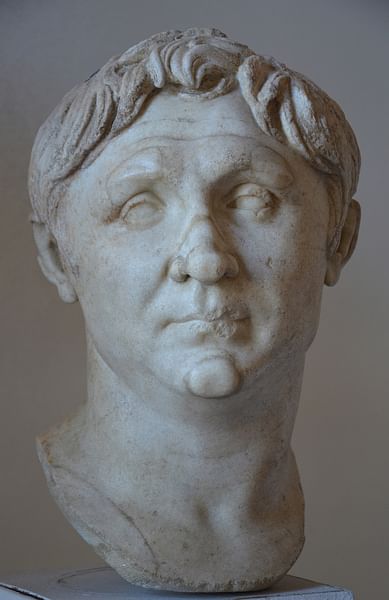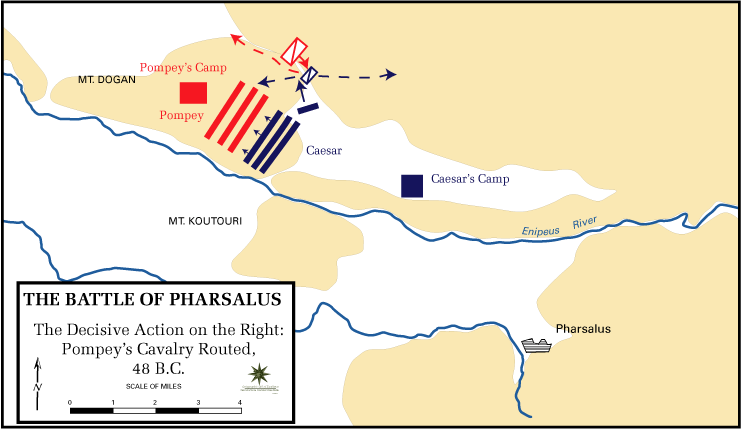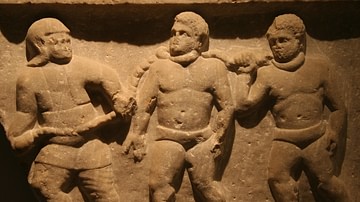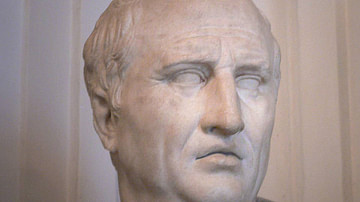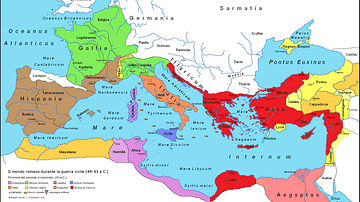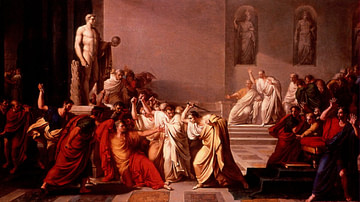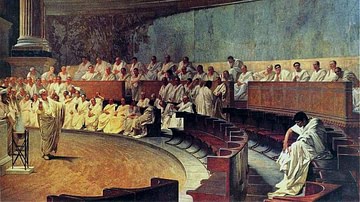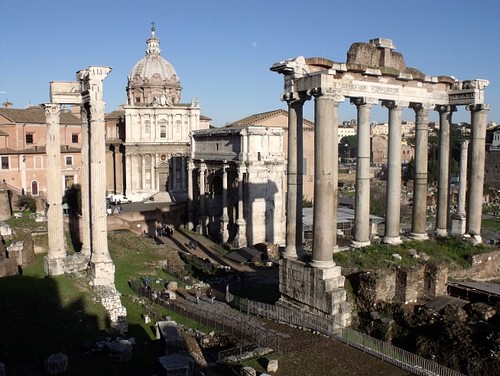
The First Triumvirate of ancient Rome was an uneasy alliance between the three titans Julius Caesar, Pompey, and Crassus which, from 60 BCE until 53 BCE, dominated the politics of the Roman Republic. Alliances have always been a part of history. Whether one looks to the unification of Sparta and Athens against the Persians in the 5th century BCE or the allied forces of the Triple Entente in World War I, nations and individuals - even former enemies - have sought assistance for one reason or another to overcome a common foe. Ancient Rome was no different. An unstable Republic and a near civil war brought three men to set aside their differences and even contempt for one another to join forces and dominate the government of Rome, even controlling elections, for nearly a decade. One of the three would eventually rise above the others and become dictator. His name was Gaius Julius Caesar. However, that was several years away. For now he was part of what modern historians have come to call the First Triumvirate.
Rome in Chaos
The Republic was in dire straits. Roman political order was in chaos. There was street violence and rioting. To some the Roman citizenry was falling victim to moral decay. The statesman, philosopher and poet Marcus Tillius Cicero had even exposed a conspiracy led by the prominent senator Lucius Sergius Catiline to overthrow the Roman leadership. Many believed that it was only a matter of time before the Republic would fall. However, three men, often referred to as “a Gang of Three”, seized the opportunity for personal gain, forming an alliance or triumvirate that would eventually transform the government. Despite individual differences and pure animosity, this “three-headed monster” would remain in control, even through bribes and threats, to dominate both the consulship and military commands.
Triumvirate Members
The three men who would change the face of Roman politics were Gnaius Pompeius Magnus (Pompey), Marcus Lucinius Crassus, and Gaius Julius Caesar. Each man had his own personal reason for joining together, realizing that he could not achieve it alone. While each had attained personal success, he wanted even more gloria and dignitas (glory and dignity). So, in 60 BCE the three men combined their resources, set aside their personal differences (Crassus, although one of the wealthiest men in Rome, actually despised Pompey) and seized control of the state; however, despite good intentions and personal achievements aside, the union was tenuous at best.
Although he considered himself a friend to both Caesar and Pompey, Cicero, who disliked the optimates (Rome's senators) as much as they did, was opposed to joining the triumvirate even though they respected his oratory skills and made regular use of his legal services. He still cherished the old aristocratic patrician values (even though many of them didn't respect him). Unfortunately for Cicero, his exposure of the Catiline conspiracy and opposition to the conservatives brought about his exile. It would take an appeal to Pompey and Caesar that allowed him to return to Rome in 57 BCE.
Eventually the differences between the alliance's members and their personal greed would spell the triumvirate's doom. For now, however, the “gang” saw an opportunity and took it, but this triumvirate did not come together overnight. The alliance had its beginning a decade earlier.
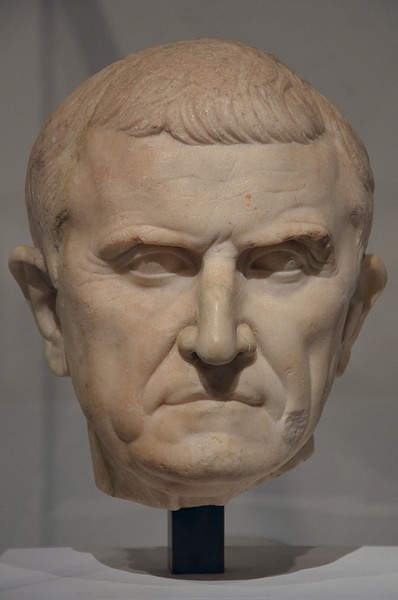
Beginnings - Crassus
In 73 BCE a Thracian named Spartacus led a revolt at a gladiator school at Capua, a city south of Rome. He and his followers went on a rampage throughout Italy. The revolt continued for almost two years, defying the Roman forces sent against them, so that in 71 BCE Crassus was sent by the Roman Senate to finally suppress the uprising. Eventually, Spartacus was killed and 6,000 of his followers were crucified along the Appian Way — the road between Rome and Capua - to serve as a warning to others. Although most of the praise should have gone to the military leadership of Crassus, Pompey, who had recently returned from Spain, attempted to steal most of the credit for the defeat even though his only accomplishment was to round up the stragglers. Afterwards, both men disobeyed Senate orders and refused to disband their armies. Although Pompey actually scorned the Republican government, the defeat of Spartacus and his followers ensured both men were named co-consuls in 70 BCE. Crassus never forgot Pompey's arrogance and always sought a military command where he, alone, would achieve glory.
Pompey
Problems in the East - piracy for one - caused a shortage of food in Rome. In 67 BCE Pompey was sent eastward to not only suppress the presence of pirates on the high seas but also confront Mithridates of Pontus who posed a dangerous threat to the power of Rome in Asia Minor by continually attacking Roman provinces. His eventual death would bring power to his heir and peace with Rome. From 66 to 63 BCE Pompey and his army marched from the Caucasus Mountains in the north to the Red Sea and would “redraw the map” in the eastern Mediterranean. He reorganized the provinces into Rome's client states, returning to the city in 62 BCE a hero. However, upon his return, he entered the city as a citizen, not a soldier, having disbanded his army. He had a new agenda: he wanted land and eastern settlement for his veterans. The idea was a logical one as no one wanted unemployed veterans in the city, and resettling them in the east would reduce tensions there; however, this was something the Senate would never approve. Standing in the way was Marcus Porcius, better known as Cato the Younger, leader of the optimates, the conservative members of the Senate.
Caesar
Two of the three had valid reasons to unite: Pompey wanted his veterans to be rewarded for their bravery in the east while Crassus hoped to gain not only dignity in a military command but also sought to recoup money he and his fellow investors had lost during the food crises in the east. The third member of the “gang” Julius Caesar, a military hero in his own right, returned from Spain in triumph, something that he hoped would help bring him additional fame and wealth. While he was not as prosperous as the others (he was actually deeply in debt), he, too, had a goal - to be named consul and afterwards gain a pro-consulship/military command in Gaul.
The Three Join Forces
However, to achieve these lofty goals, all three realized that mutual support was essential, so by pooling their personal resources (mostly Crassus' money), contacts (Cicero) and most of all ambition, they set their plan in motion. The first order of business: Caesar was able to reconcile the differences between Pompey and Crassus. Next, he married his daughter Julia to Pompey to seal the alliance. Together, the “gang” overcame their first obstacle when Caesar was named co-consul for the year 59 BCE with Marcus Calpurnius Bibulus, unfortunately a good friend of Cato. In his The Twelve Caesars Roman historian Suetonius wrote that Caesar,
… succeeded in conciliating Pompey and Marcus Crassus - they were still at odds after their failure to agree on matters of policy while sharing the consulship. Pompey, Caesar, and Crassus now formed a triple pact, swearing to oppose all legislation of which any one of them might disapprove. (16)
Despite his best efforts, Caesar was unable to push Pompey's agenda or any of his other reforms through the Senate. By law a consul had the right to veto a proposal made by his fellow consul, and that was exactly what Bibulus did, so instead of fighting with the Senate, Caesar took his idea to the popular assembly. As Caesar stood in the Forum and presented his proposal to the assembly, Bibulus attempted to interfere but instead was thrown down the steps of the Temple of Castor where he was showered with garbage. He returned to his home where he remained out of public life. Caesar would rule as consul alone. Cato finally admitted defeat and accepted the bill; the veterans got their land. The triumvirate was apparently working.
Crassus' Death
After the end of his consulship Caesar and his army crossed over the Alps into Gaul where he would spend the next ten years, returning to Italy in triumph in 50 BCE. Pompey, already feeling a tinge of jealousy over Caesar's success, won favor with the Senate when he was given command over the city's grain supply in 57 BCE after a series of food riots. Next, Pompey and Crassus returned to a joint consulship in 55 BCE. Afterwards, Pompey was named governor of Spain although he remained in Rome and ruled Spain through a series of deputies. Elsewhere, Crassus got his wish and was awarded the command of an army, hoping to achieve personal fame in the east. Unfortunately, he would never realize his goal. In 53 BCE at the Battle of Carrhae he was defeated, killed, and decapitated by the long-time enemy of Rome, the Parthians. In a further insult his head would be used as a prop by the king in a presentation of the Euripides play The Bacchae. His death spelled the doom for the triumvirate. Although the alliance had been renewed in 56 BCE at Luca (Caesar had even left Gaul to attend), Crassus had been the glue that held them together. The split widened between Caesar and Pompey when Pompey's wife and Caesar's daughter Julia died in childbirth in 54 BCE.
Civil War - Caesar as Dictator
With 40,000 soldiers Caesar crossed the Rubicon and returned to Rome. He was wealthier and more powerful, desiring a return to politics and the consulship - the latter was something both Pompey and the conservatives opposed. By now Pompey was the favored son of the Senate. He had even been named consul in 52 BCE with the full support of Cato. Later, he was rewarded with the command of the Roman forces in Italy. The deep hatred that had lay dormant for years between Caesar and Pompey, together with Pompey's jealousy, led to a civil war.
Because of his friendship with both men, Cicero grew concerned over the hostility between Caesar and Pompey, He wrote to Caesar in March of 49 BCE,
… if you are disposed to protect our friend Pompey and reconcile him to yourself and the state, you will certainly find no one better adapted to that aim than myself. … I have always advocated peace … now I am deeply concerned for the rightful position of Pompey. (Grant, 81-2)
Cicero further added that he still considered both of the men his friends and hoped to “…achieve a conciliation between yourself and Pompey, and peace for the people of Rome.” Caesar wrote back that he trusted Cicero would not interfere. “Although I was convinced that you would take no rash or ill-judged action...in the name of our friendship, that you should not make any move, now that things have gone my way.”
Pompey left Rome with his army for Greece and was followed by Caesar. In 48 BCE they met in the Battle of Pharsalus. Caesar was victorious. Pompey fled to Egypt where he was murdered on the beach on the orders of Ptolemy XIII and beheaded. His head was then presented to Caesar. Caesar would go on to secure his power in both Asia Minor and northern Africa, eventually returning to Rome where he served in his new role as dictator only to die by assassination on the Ides of March 44 BCE.
